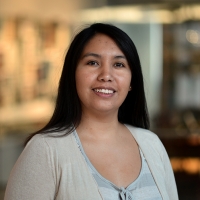Claudia Huichalaf, PhD
Postdoctoral Associate
Postdoctoral Fellow, Baylor College of Medicine
Baylor Department
Neuroscience
Education
Ph.D., Molecular Medicine Universita Vita Salute San Raffaele, Milan-Italy , 2013
M.S., Molecular Biotechnology Engineer University of Chile, Santiago-Chile, 2006
B.S, Molecular Biotechnology University of Chile, Santiago-Chile, 2003
Biography / Research Summary
Alzheimer’s Disease (AD), the most common form of dementia, appears to arise through a toxic gain-of-function mechanism, whereby overproduction or aberrant accumulation of a normal cellular protein becomes neurotoxic. Genetics studies have identified triplication of amyloid precursor protein (APP) as one cause of familial AD, while missense mutations in APP affect enzymatic processing of the precursor to promote aggregation of the resulting peptide fragments. Amyloid aggregates are a common feature of both inherited and sporadic AD, suggesting that amyloid formation, or APP processing more broadly, is a common mechanism of pathogenesis. My research seeks to elucidate the cellular machinery controlling APP stability and turnover by testing candidate modifiers that have been identified through genetic screens performed by collaborators in the Zoghbi and Botas labs. From these cross-species screens we hope to identify evolutionarily conserved regulatory pathways that could serve as new entry points for pharmacological intervention towards future treatment of AD.
Research Interest
Aβ Precursor in Alzheimer's Disease


